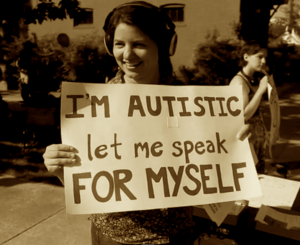 |
Don't you loathe it when people talk of 'SEN children'?
Schools might say 'our SEN children make good progress' or 'we don't have the resources to support SEN children' and LAs might say 'we provide excellent services for our SEN parents and children''.
Even charities might talk of children with SEN as if they are a breed apart. A separate, and often optional add-on, to the mainstream agenda. A group that needs a 'special' bill, a 'special' department, and, most often, a 'special' TA.
Well, of course, our children are special. But not in the way they mean. And the more we emphasise the 'specialness' of children with additional needs in our schools, the more we are saying to those schools, to our teachers, and to education commentators generally: it's ok, you don't need to bother with these kids, they are a specialist subject.
They are not. And while we hear lucid and proper debate about the risks of religious segregation or racial or homophobic bullying in our schools, when do we ever hear about disability discrimination and disability segregation and exclusion as part of the mainstream education agenda? Never.
Is it all in the name? The term 'special needs' was introduced over thirty years ago by the Warnock Report which advocated the inclusion of children with SEN into mainstream schools.Today, inclusion remains poorly defined as a concept and this makes its success or failure difficult to measure. But, in its most basic sense, inclusion is about rights: the child’s right to participate fully in education and socialization and a society’s duty to accept all children within its education system. This, in turn, can promote acceptance of diversity in the broader community because inclusion is not the same as ’integration’, which implies a normalizing of children with SEN: inclusion promotes respect for difference.
Perhaps, the evolution of a SEN model to address the ‘needs’ of children is to blame. It is distinct, for example, from the broader model of legislative action on disability equality which rests on the empowerment of the individual through the elimination of discrimination and prejudice and the protection of rights. This arises from a social model of disability which focuses not on the effects of impairments that disable people but the barriers they experience. It demands legal obligations to identify and remove the barriers to inclusion, enabling people with disabilities to have control over their own lives This ‘affirmation model’ of disability stands in stark contrast to the deficit discourses of ‘special educational needs’ where parents and children are left begging schools and LAs to recognise and then meet their 'needs' - please, if you could be so kind.
 |
| ©http://www.flickr.com/photos/riacale/ |
In reality, unlike disability, the term ‘special needs’ is no longer neutral: it may even be used as a term of abuse. Articulating SEN issues in terms of rights can only improve the lot of children. Children with SEN form an extremely vulnerable group. Statistically, they are disproportionately from disadvantaged backgrounds, they are much more likely to be absent or excluded from school, and they achieve less well than their peers, both in terms of their attainment at any given age and in terms of their progress over time. Irrespective of the Equality Act, parents frequently report relentless daily battles for simple reasonable adjustments to be made for their children with schools who see these adjustments as 'special treatment'. LAs appear to pay no attention to the Act when organising or delivering very basic levels of SEN provision which enable children to access education.
This all matters because,over the last five years, outcomes for this group of children have changed very little. Ofsted’s report in 2010, Local authorities and home education, details how children with SEN may end up being withdrawn from schooling because of a failure to meet their SEN. It also found that, even when in school, children with SEN may be excluded from participation in the day to day activities of, or the social opportunities that school provides.
Would we tolerate this widespread, persistent, and often low-level daily discrimination based on other protected characteristics (under the Equality Act): gender, race, religion? This is a problem for our education system and our society so it is unacceptable that SEN issues continue to be hived off and sidelined away from the mainstream agenda in education. Look at the Children and Families Bill for example. How many head teachers or ordinary teachers have any idea what it will mean?
So what would happen if we spoke of children’s educational rights rather than their special needs?Take a moment to look at the case of a ten year old disabled pupil from St Hilary’s Primary School in East Kilbride who won his case to access after school guitar classes under the Equality Act. Perhaps, emphasising rights not needs in schools, will help us build a genuinely inclusive environment.
No comments:
Post a Comment